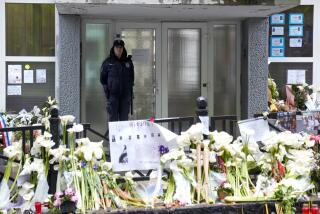Serb Besieging Sarajevo Agrees to Big-Gun Supervision : Civil war: U.N. would gain access to weapons. But earlier promises have not held.
- Share via
SARAJEVO, Bosnia-Herzegovina — The leader of Bosnia’s Serbs agreed Wednesday to put his heavy weapons around Sarajevo under U.N. supervision.
Serbian militiamen also ended a 3 1/2-month siege of Gorazde, according to soldiers loyal to the Muslim-dominated government. But a Bosnian military leader said the war there is not over.
Despite the agreement by Serb leader Radovan Karadzic to allow U.N. monitoring of Serbian artillery, mortar shells fell again on Sarajevo and loyalist troops pressed on with their desperate attempt to break through Serbian forces that have encircled the capital of Bosnia-Herzegovina for five months.
In Brussels, the North Atlantic Treaty Organization secretary general, Manfred Woerner, said the 16-member alliance would send troops to help guard relief for Bosnia.
NATO sources, speaking on condition of anonymity, said the force would number 6,000. The United Nations already has 1,600 troops in Bosnia, most in Sarajevo.
U.N. officials said a U.S. C-130 transport plane that flew to Sarajevo on Wednesday was the 1,000th flight in a 2-month-old U.N. airlift for the city’s estimated 450,000 residents.
Numerous past cease-fire pacts have quickly collapsed, and earlier promises by the Serbs to have U.N. troops monitor heavy weapons have not slowed the fighting.
Fred Eckhard, the U.N. spokesman in Sarajevo, said Karadzic signed the supervision agreement Wednesday after talks with U.N. military officers on the details of how Serbian weapons would be monitored.
U.N. soldiers began surveying 11 collection points in the city, and military observers were to move there today or Friday, Eckhard said.
He said the agreement covers all Serbian mortars 82 millimeters (a barrel diameter of about 3 1/4 inches) and larger, all tanks with guns and all artillery pieces 100 millimeters or larger in and around Sarajevo.
SRNA, the Bosnian Serb news agency, said the accord also covers heavy weapons in the central town of Jajce and in Bihac in northwestern Bosnia. But there is no U.N. presence in Jajce and only a small observer contingent in Bihac.
Marrack Goulding, the United Nations’ top peacekeeping official, was expected in Sarajevo today to begin laying the groundwork for a “greatly expanded command center of U.N. forces in Sarajevo,” Eckhard said.
“It’s a signal that the international community is not intimidated by the continuing violence, but rather that they are determined to stick with this problem until it is resolved,” he said.
Karadzic called on Bosnian government forces to also put their Sarajevo artillery under U.N. supervision. He warned that if loyalist troops “continue attacking us and razing our homes, either the U.N. or we will intervene.”
Eckhard said U.N. officials are working on a separate agreement with the Bosnian government.
Karadzic had announced Saturday that Serbian forces would pull back from Gorazde, a city 40 miles east of Sarajevo that was the last Bosnian government holdout against a Serbian offensive that swept over eastern Bosnia. Tens of thousands of people had been trapped by the siege.
Mustafa Hajrulahovic, government forces commander in Sarajevo, said Gorazde’s defenders took advantage of the Serbian withdrawal to drive the Serbs from the surrounding area.
For the 24-hour period ending at noon Wednesday, Bosnia’s Health Ministry reported 37 dead and 234 wounded across the republic, including 25 dead and 144 wounded in Sarajevo.
Norway’s foreign minister, Thorvalld Stoltenberg, who met with both sides Wednesday in a fact-finding mission, said he was “leaving Sarajevo less optimistic about peace than when I came.”
Eckhard conceded that stopping the war would depend on whether the parties live up to their pledges. “In the past, that has been suspect,” he said.
More to Read
Sign up for Essential California
The most important California stories and recommendations in your inbox every morning.
You may occasionally receive promotional content from the Los Angeles Times.













